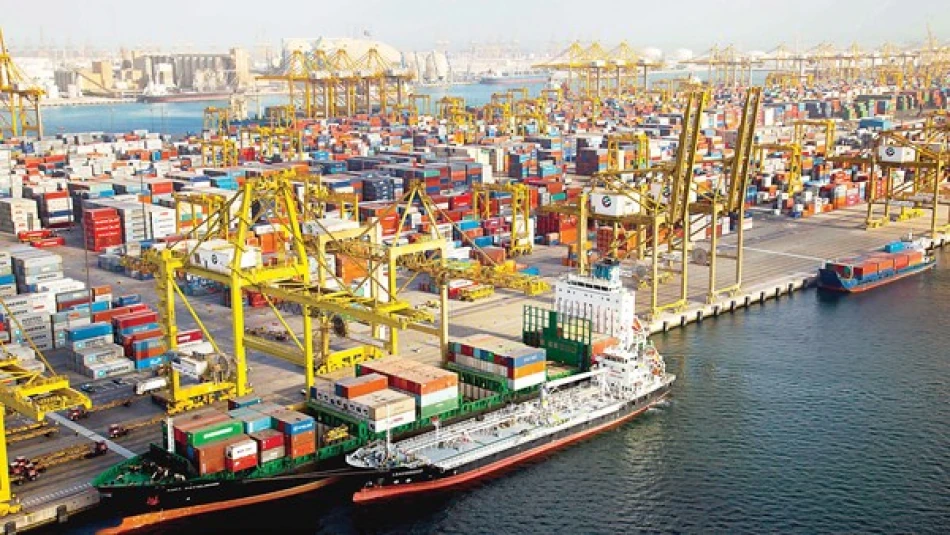
Dubai Ranks Among Top 5 Global Logistics Hubs, Leading in Arab World
Dubai Solidifies Global Maritime Dominance as Top-Five Shipping Hub
Dubai has secured its position among the world's top five international shipping centers while claiming the number one spot in the Arab region, according to the 2025 International Shipping Center Development Index. This achievement underscores the emirate's strategic transformation into a critical global logistics nexus, backed by substantial infrastructure investments and forward-thinking sustainability initiatives that position it to capture growing trade flows between East and West.
Strategic Maritime Infrastructure Drives Global Recognition
The ranking, published jointly by China's official Xinhua News Agency and the Baltic Exchange, reflects Dubai's comprehensive maritime ecosystem that extends far beyond basic port operations. The emirate has built an integrated network encompassing navigation services, shipbuilding, and vessel repair capabilities that can accommodate increasing ship traffic while maintaining service quality standards.
Sheikh Dr. Saeed bin Ahmed bin Khalifa Al Maktoum, Executive Director of Dubai Maritime Authority at the Ports, Customs and Free Zone Corporation, attributed this success to strategic partnerships across the maritime sector and continuous infrastructure development. This coordinated approach has enabled Dubai to compete effectively with established maritime powers like Singapore, Rotterdam, and Hong Kong.
Jebel Ali Port: The Regional Powerhouse
Central to Dubai's maritime success is Jebel Ali Port, which serves as the primary shipping hub for the broader Middle East and South Asia region. The port's advanced capabilities have made it indispensable for global supply chains, particularly as companies seek alternatives to traditional shipping routes through the Suez Canal or look to establish regional distribution centers.
The facility's strategic location allows it to serve as a transshipment hub connecting Asian manufacturers with European and African markets, while also facilitating trade flows to the growing economies of the Indian subcontinent. This positioning becomes increasingly valuable as global trade patterns shift and companies diversify their supply chain routes.
Green Maritime Revolution Sets Dubai Apart
Dubai's sustainability initiatives represent a significant competitive advantage in an industry under increasing environmental pressure. The port has implemented comprehensive decarbonization measures that go beyond regulatory compliance to establish new industry standards.
Concrete Environmental Impact
The emirate's green maritime strategy includes several measurable initiatives: installation of 50,000 square meters of solar panels for renewable energy generation, introduction of biofuel bunkering services for vessels, and deployment of electric container-handling vehicles. These measures have already achieved a reduction of 2,000 tons of carbon dioxide emissions annually.
This environmental focus positions Dubai favorably as global shipping companies face mounting pressure from regulators and customers to reduce their carbon footprint. The International Maritime Organization's decarbonization targets make ports with established green infrastructure increasingly attractive to major shipping lines.
Market Implications and Competitive Positioning
Dubai's top-five global ranking carries significant economic implications beyond prestige. Maritime hubs that achieve this status typically see increased investment in related industries, from logistics and warehousing to financial services and maritime insurance. The ranking also strengthens Dubai's negotiating position with major shipping alliances when securing new route commitments.
Regional Leadership Advantage
As the leading Arab maritime center, Dubai is well-positioned to benefit from the region's economic diversification efforts and growing intra-regional trade. The emirate's maritime infrastructure supports the broader Gulf Cooperation Council's ambitions to reduce dependence on oil revenues while building knowledge-based economies.
Captain Ibrahim Al Balushi, Executive Director of Dubai Ports Authority, emphasized the port's dual role in serving both global and regional markets. This positioning allows Dubai to capture value from multiple trade flows while maintaining resilience against disruptions in any single route or market.
Future Growth Trajectory
The 2025 ranking reflects Dubai's successful execution of long-term maritime development plans, but also sets the stage for continued expansion. The emirate's commitment to regulatory innovation and adoption of international best practices suggests it will maintain its competitive position even as other regions invest heavily in port infrastructure.
Dubai's integrated approach—combining physical infrastructure, regulatory frameworks, and sustainability initiatives—creates a model that other emerging maritime centers will likely attempt to replicate. However, the emirate's early-mover advantage in green port technologies and its established position in key trade routes provide substantial competitive moats that will be difficult for competitors to overcome in the near term.
Most Viewed News

 Layla Al Mansoori
Layla Al Mansoori






